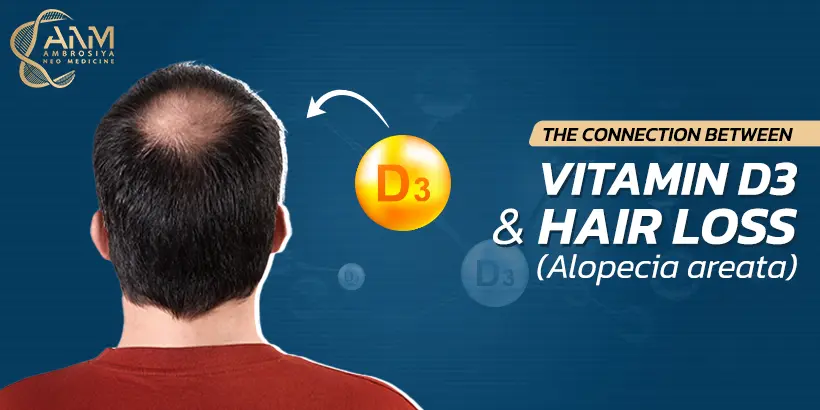The connection between Vitamin D3 and Hair Loss (alopecia areata)
Introduction:
Hair loss, specifically alopecia areata, can have a significant impact on an individual’s self-esteem and overall well-being. Understanding the potential underlying factors contributing to hair loss is crucial in developing effective strategies for prevention and treatment. In recent years, researchers have explored the connection between Vitamin D3 and hair health, uncovering intriguing links that warrant further investigation. In this article, we delve into the relationship between Vitamin D3 and alopecia areata, shedding light on the role of this essential vitamin in maintaining healthy hair.
Understanding hair growth and the Role of Vitamin D3:
To comprehend the connection between Vitamin D3 and hair health, it is important to grasp the fundamentals of hair growth and the role of hair follicles. Each hair follicle undergoes a cyclic process of growth, rest, and shedding, influenced by a complex interplay of genetic, hormonal, and environmental factors. Vitamin D3, a fat-soluble vitamin synthesized in the skin upon sunlight exposure, plays a vital role in regulating hair follicle function.
Research evidence on Vitamin D3 and hair loss:
Scientific studies have provided valuable insights into the potential association between Vitamin D3 deficiency and hair loss. Several investigations have demonstrated a higher prevalence of Vitamin D3 deficiency in individuals with alopecia areata compared to those without the condition. Furthermore, research has revealed the potential of Vitamin D3 in promoting hair growth and preventing hair loss, underscoring its significance in maintaining a healthy scalp and hair follicles.
Vitamin D3 deficiency and alopecia areata:
The relationship between Vitamin D3 deficiency and alopecia areata is multifaceted. Vitamin D3 deficiency can adversely affect the immune system, leading to dysregulation and autoimmune responses that target hair follicles. These autoimmune processes can contribute to the development of alopecia areata, characterized by patchy hair loss. Understanding the mechanisms linking Vitamin D3 deficiency and alopecia areata is vital in devising effective therapeutic interventions.
To gain a deeper understanding of its deficiency and sources read a blog (Unveiling the Power of Vitamin D3: Sources, Deficiency, and Solutions)
Vitamin D3 supplementation for hair health:
Supplementation with Vitamin D3 may offer potential benefits for individuals experiencing hair loss. The recommended dosage of Vitamin D3 varies based on individual needs, and consulting with a healthcare professional is crucial to determine the appropriate dosage for hair health. Supplementation can be particularly beneficial for individuals with confirmed Vitamin D3 deficiency or those at higher risk of deficiency due to factors such as limited sunlight exposure.
Dietary sources of Vitamin D3 for hair health:
In addition to supplementation, incorporating natural food sources rich in Vitamin D3 can contribute to hair health. Fatty fish, such as salmon and mackerel, are excellent sources of Vitamin D3. Additionally, dairy products, eggs, and fortified foods like cereals and orange juice can provide significant amounts of this essential vitamin. Including these foods in a balanced diet can support optimal Vitamin D3 levels and promote healthy hair growth.
Sun exposure and Vitamin D3 synthesis:
Sun exposure remains an important factor in Vitamin D3 synthesis. Spending time outdoors, particularly during peak sunlight hours, can stimulate the skin’s production of Vitamin D3. However, it is essential to strike a balance between sun exposure and skin protection to minimize the risk of sunburn and skin damage. Applying sunscreen and wearing protective clothing while still allowing for adequate sun exposure can help optimize Vitamin D3 synthesis.
Other factors influencing hair health:
While Vitamin D3 plays a crucial role in hair health, it is essential to consider other nutritional factors that contribute to overall hair health. A well-balanced diet rich in essential nutrients, including vitamins, minerals, and antioxidants, is key to supporting optimal hair growth and preventing hair loss. Additionally, lifestyle habits such as managing stress, getting regular exercise, and avoiding excessive heat styling can contribute to maintaining healthy hair.
Lifestyle and hair care tips for promoting hair health:
Alongside incorporating Vitamin D3-rich foods and maintaining a nutritious diet, certain lifestyle and hair care practices can enhance hair health. Staying hydrated by drinking an adequate amount of water, avoiding harsh chemical treatments, and using gentle hair care products can help protect and nourish the hair. Additionally, managing stress levels through relaxation techniques and getting sufficient sleep can positively influence hair growth and overall well-being.
Conclusion:
The connection between Vitamin D3 and hair health presents an exciting avenue for research and potential interventions for individuals experiencing hair loss, specifically alopecia areata. Understanding the influence of Vitamin D3 on hair follicle function and its potential role in immune regulation provides valuable insights for promoting healthy hair growth. By embracing a holistic approach that includes supplementation, dietary modifications, sun exposure, and healthy lifestyle habits, individuals can optimize their hair health and unlock the potential benefits of Vitamin D3.

